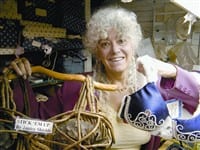Breast of the Story
Judith Fine calls it “Breast Prosthesis 101.”
That’s the informal discussion she has with those women who come to her store following a mastectomy.
This is a difficult time for such individuals, said Fine, owner of the Gazebo in Northampton, a landmark intimate apparel store, noting that these women are concerned about not only their health, but also their self-esteem. That’s why she takes things slow as she offers her discourse on breast prosthetics.
She talks about the various options available, the materials now used in prosthetic breasts — rubber has given way to silicone — and how they are carefully made to match the size, weight, and drape of the remaining breast. That’s because aesthetics is not the only consideration here.
“If you’ve carried an even weight on your chest wall all your life and now you’re carrying an uneven weight, that is going to affect you in your back, in your neck, and in your shoulders,” she said.
After the talk comes the fitting, which is also a very important consideration, she said, noting that most women walk around in bras that are not the right size.
All in all, this can be a fairly difficult experience, said Fine, noting quickly that it is even more so for women who are uninsured or, as happens more often, underinsured. That’s why Fine started Gazebo’s Breast Form Fund 12 years ago. The program helps women in those categories obtain correct breast forms and foundations, both full and partial, necessary to aid in their recovery.
The program, which has had several different funding mechanisms over the years, including the unusual but highly successful “Show Us Your Bra” contest, has helped more than 200 women meet the cost of breast prosthetics and bras (usually $400 or more). And Fine expects the number of uninsured and underinsured to rise in the years ahead as the population ages and gaps in coverage become more prevalent.
Fine, who was honored for her work at last month’s American Cancer Society Omar T. Pace Recognition Dinner, told The Healthcare News that she wants to take her program and expand its reach.
She has formed her own non-profit group, called the Breast Form Fund, to raise funds and administer the program, and she has informal plans to take the initiative across Western Mass., then the state, and eventually across the region and to the nation. This won’t happen overnight, she stressed, but she believes that, eventually, her goal will be realized.
Offering Support
Fine told The Healthcare News that she has been active in a number of civic and social endeavors since she opened Gazebo in 1978. She served several terms on the Northampton City Council, and she’s been president of the city’s Chamber of Commerce, a corporator at Florence Savings Bank, and an active participant in programs to boost the community’s eclectic downtown.
Her involvement in breast cancer was a more personal footnote, she said, noting that when her husband was diagnosed with colon cancer in the early ’90s, she gained firsthand knowledge of how traumatic the disease can be, and looked for ways to provide support for others coping with cancer and its aftereffects.
As the owner of an intimate apparel store, she considered it a logical extension of her business to offer lines of bras and other products for post-mastectomy clientele, and in 1991 she began offering Dignity, a full-range fitting service for such individuals. Recognizing that not all women who came in the door could easily afford the prosthetics and bras needed, she started Gazebo’s Breast Form Fund in 1995.
She described work with all post-mastectomy patients as very rewarding because it helps those women maintain a sense of dignity — as well as their balance.
“A woman will tend to change her posture to cover the fact that she’s had a mastectomy,” said Fine. “Instead, she should stand up tall and proud; we help give them the silhouette they want and need to move on with their lives.”
Funding the Breast Form Fund has always been a challenge, however, said Fine, noting that in the early going, she tapped into a fund administered by the American Cancer Society to help those who were uninsured or underinsured. That fund eventually dried up, however, and Fine tried to fund her program herself. That proved unrealistic, however, and she later established a relationship with the Northampton-based Cancer Connection, a non-profit group that offers free support and programs to cancer survivors and their families.
A few months ago, Fine severed those ties and formed her own non-profit 501(c) to administer the fund, as part of a movement to take the program well beyond its current scope in Western Mass. and involve other fitters, breast health centers, and health care providers.
“It’s going to take some time, and I plan to do it in small bites,” she explained. “But eventually, I want to expand across this region, and then, eventually, across the country.”
Fine said she will be aggressive and imaginative in her pursuit of funding sources for a broader Breast Form Fund, and welcomes donations from area businesses and individuals. She expects that the program will be eligible for grants from a number of different sources because of the way it touches many constituencies and involves not only health care, but also education.
“My hope is that there will be grants available to a program like this, which focuses on both health care and education, and also impacts a number of populations, starting with women, but also the elderly, the Latino community, and others,” she said. “It’s health-related, it’s women-related, it’s breast cancer-related, and the ‘Show Us Your Bra’ program is art-related, so there have to be funding sources out there that I can tap into.”
She’s also hoping to forge a partnership with one or more of the intimate apparel makers whose products she sells. Fine mentioned Jockey, a popular label, but she said there are several manufacturers who may wish to get involved with a program that assists women of all ages.
Meanwhile, the “Show Us Your Bra” initiative has been very successful since it was launched four years ago, said Fine, noting that it has several facets. First is the actual contest itself, which invites individuals with all levels of artistic ability to create whimsical, non-functional bras for display, judging, and sale at an auction.
The entries have come in all shapes, sizes, and materials, and with names as creative as the objects. The “Wizard of Bras” entry from a few years ago captured the essence of that movie, while an entry fashioned from two red Converse All Star sneakers was dubbed “Converse-ation Piece.”
In addition to the auction, the program includes a calendar comprised of 12 of each year’s top entries, said Fine, adding that the item is sold in a number of area stores, raising additional monies. All told, the “Show Us Your Bra” effort raises between $25,000 and $30,000 annually, and provides not only funds, but an engaging way for people to become part of the process of fighting cancer and provide support for those who survive it.
“It’s touching to see how many people take part and put so much effort into their work,” Fine said. “And it’s also an effective way to bring a little humor to what is otherwise a very serious subject.”
In the Loop
Fine said the Gazebo’s philosophy has always been to “help all women feel good about themselves.” For those who have undergone a mastectomy, this is often a challenging assignment. She said she goes about that task with a blend of understanding, compassion, and, when needed, a touch of humor. For women who are underinsured or uninsured, it takes more than that; a different kind of support is necessary. Fine’s efforts over the past decade have helped to fill a gap, and now she wants to take her program to a higher plane.



Comments are closed.